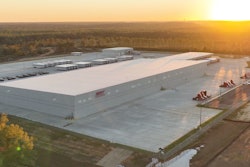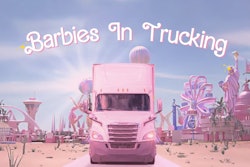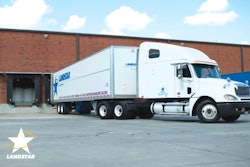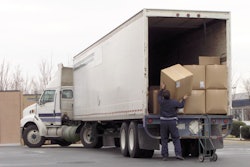Predatory towing practices in the trucking industry have become a significant issue, with many motor carriers experiencing excessive rates for towing jobs.
The American Transportation Research Institute (ATRI) conducted research on this topic to gain a better understanding of predatory towing, the regulations surrounding it, and how often it occurs. ATRI found that nearly one-third of crash-related tows involved predatory billing practices.
Joining Jason and Matt this week on the 10-44 is ATRI research associate Alex Leslie, who walks us through the details of the report.
Contents of this video
00:00 10-44 intro predatory towing
01:12 Predatory towing
01:53 Towing and Recovery industry challenges
05:17 What is predatory towing?
06:52 Types of predatory towing
08:44 Predatory billing
11:16 Insurance
13:15 It’s not always the towing company’s fault
14:39 State regulated tow rates
17:06 How to avoid being a victim of predatory towing
Jason Cannon:
This week's 1044 is brought to you by Chevron Delo 600 ADF Ultra Low Ash Diesel Engine Oil. It's time to kick some ash.
Matt Cole:
Predatory towing practices have been a hot topic in trucking for several years. How bad is the problem and what can trucking companies do about it?
Jason Cannon:
You're watching CCJ's 1044, a weekly webisode that brings you the latest trucking industry news and updates from the editors of CCJ. Don't forget to subscribe and hit the bell for notifications so you'll never miss an installment of 1044.
Hey everybody. Welcome back. I'm Jason Cannon and my co-host, as always, on the other side is Matt Cole. Excessive charges for towing and recovery has seemingly been more and more prominent in the last several years, and new research conducted by the American Transportation Research Institute has shown that a lot of motor carriers are experiencing excessive rates for towing jobs.
Matt Cole:
ATRI's research also found that nearly a third of crash-related tows included some form of predatory billing based on an analysis of carriers records of towing invoices from 2021 through 2023. Joining us this week on the 1044 is ATRI research associate Alex Leslie, who walks us through the details of the report. First though, he tells us why ATRI took up the research in the first place.
Alex Leslie:
It's an issue that we've heard complaints about for years that motor carriers are concerned about and that a lot of the state trucking associations are very concerned about and have often asked us about too. Really, part of that big push was that there really just has not been research on this topic at all. Sometimes ATRI is diving into something where there has been a lot of research and maybe there's a certain angle or a certain perspective that needs to be added, but in the case of predatory towing, there's just so little data because it is such a case-by-case kind of issue that they really felt it was a need to be able to get a better view of the land and some actual data.
Jason Cannon:
Now, just like the freight transportation side of the trucking industry, ATRI makes it clear in its research that the towing and recovery industry also has its fair share of challenges.
Alex Leslie:
You don't have a reliable supply chain or trucking industry without towing professionals. The towing and recovery industry is a vital partner, and so I want to say it upfront, but of course we know that there are a lot of great towing and recovery companies out there, that the majority of them are behaving well. They do face a number of challenges. Of course, they have to be able to respond to accidents at any time, weather, that can be a huge issue, and again, on a case-by-case basis, whatever has crashed. On top of that, the equipment that they use is expensive. Heavy duty rotators and wreckers are expensive, top-of-the-line pieces of equipment, and in a lot of parts of the country, they just aren't being necessarily used a ton. What we found is that something like 45% of towing and recovery companies operate in a county where there are fewer than 12 annual truck-trailer towing crashes per company. If you have a rotator and you're one of those companies, you may only be using it 11 times a year. That is a challenge to obviously recuperate value on those assets.
Another challenge I'll mention quickly too is the prioritization of quick clearance, right? In a lot of states you have laws explicitly about this in different jurisdictions, at local levels too, lots of priority put on getting those roadways clear as quickly as possible. When that happens, sometimes the negative side effect of that good objective of course is that you have over-deployment of towing resources, which then might be reflected in a higher bill than what was strictly necessary.
Matt Cole:
Alex explains that ATRI's goals for the research were to get a better understanding of what predatory towing is, the regulations around towing, and how often predatory practices are occurring. We'll hear more on that after a word from 1044 sponsor, Chevron Lubricants.
Jason Cannon:
Protecting your diesel engine and its after-treatment system has traditionally been a double-edged sword. The same engine oil that is so essential to protecting your engine's internal parts is also responsible for 90% of the ash that is clogging up your DPF and upping your fuel and maintenance costs. Outdated industry thinking still sees a trade-off between engine and emission system protection, and Chevron was tired of it, so they spent a decade of R&D developing a no-compromise formulation. Chevron Lubricants developed a new ultra-low ash diesel engine oil that is specifically designed to combat DPF ash clogging. Delo 600 ADF with OmniMax technology cuts sulfate ash by a whopping 60%, which reduces the rate of DPF clogging and extends DPF service life by 2.5 Times. Just think what you can do with all the MPGs you're going to add from cutting your number of regions. But Delo 600 ADF isn't just about after-treatment, it provides complete protection, extending drain intervals by preventing oil breakdown. Before you had to choose between protecting your engine or your after-treatment system, and now you don't. 600 ADF from Delo with OmniMax technology, it's time to kick some ash.
Alex Leslie:
We really wanted to get a sense for what does the big picture look like, again, with that total absence of data on predatory towing, even on just the most basic questions of what even is predatory towing, what are the regulations out there, and how often does it even happen? For answering those three questions, we really had to sort of split up and tackle some separate issues. We had my coworker... Alexa was digging through all the regulations out there at the state level to build one big compendium of what that looks like which is part of the report. In addition, then we carried out a large motor carrier survey where we tried to get that broader picture of what are the issues that you're encountering out there with towing especially, but not exclusively, after a crash?
That is the most common case where towing can become predatory, but there are other forms too, like impound, private property towing, for example. Then, the third big component was this study of towing invoices and focusing on predatory billing specifically, which was the most common kind of predatory practice that we found. We were able to focus in on invoices to then really get in on that specific issue. But throughout the whole process, on top of that, we were interviewing towing companies that are doing a really conscientious job and insurers who work with this issue as well as legal experts. It really is a comprehensive report that touches on a bit of everything.
Jason Cannon:
Alex says there are several different types of predatory towing that are commonly experienced by carriers.
Alex Leslie:
We looked at, first of all, just the broad level of how many fleets have encountered certain issues, and the most common we found was excessive hourly or per pound rates. That could be on equipment that could be on labor. We saw that 82.7% of carriers had encountered that at some point in 2021. Again, that's a majority of carriers. Of course if you're operating large fleet, you've got more crashes so it's not the carrier level there, but that's a very high number. The second most common was unwarranted additional equipment or labor charges, so things like over-deployment or being charged for miscellaneous fees that were redundant or overhead costs that shouldn't have been billed that way. That was about 82% percent of motor carriers experienced that.
We also saw a majority of motor carriers experience excessive storage rates, vehicle release delays or access issues, cargo release delays is a really big one as well. That impacts, of course, not just the fleet's bottom line with that truck, but also the relationship with the shippers, with business partners, which can be really detrimental. We saw damage due to the use of improper towing equipment was also experienced by about 59% of carriers, vehicle seizure without cause about 56% of carriers, and then misreported tows, non-consensual tows reported as consensual was another that we saw more than half of carriers encounter.
Matt Cole:
As Alex mentioned, predatory billing practices are the most common issues experienced by carriers.
Alex Leslie:
We found that 29.8% of invoices had some form of excessive billing predatory practice, which is pretty hot. We found that percentage actually goes up as the bills get more expensive too. The way we approached this was we transcribed all those invoices, we were working with about 500. We looked at, "Okay, when do rates become over 50% more than the median rate, so that middle rate?" That was the threshold we used generally for determining whether an invoice was charging a predatory rate. There were a couple line items that were used twice as high rather than 50% higher, just to help represent the fact that, again, towing companies do have their own costs. Storage costs, for example, vary a lot depending on what part of the country you're in and what your real estate prices are.
Then, we looked at each individual piece of equipment or labor or storage, admin fees and miscellaneous costs, and tried to identify how many were in fact predatory. What we found was that the most common form of predatory billing was miscellaneous costs. We saw those in about 8% of all the invoices that we had. We define that as miscellaneous costs is any line item, any charge that's basically for something smaller than a skid steer, and then we added those all together for each invoice and figured out what percent of the final bill they represent. Any invoice that had more than 25% of the total cost in those miscellaneous charges we considered as excessive. That can include anything from oil cleanup to drive shaft removal to charges for gloves, lights, and radios. Again, some of those miscellaneous costs are going to be inevitable in a lot of crashes, right? Oil cleanup, that's got to happen. What becomes excessive is when it's over 25% of that bill, and that excludes all hazmat crashes, becomes predatory in that case.
That was the biggest one, but it was followed pretty closely by equipment rates, those were at 6.3%, and then administrative fees were excessive in 6.5% of the invoices that we saw.
Jason Cannon:
You can't talk about crash-related tows without also talking about the impact on insurers and their role in paying for tows, which also impacts carriers.
Alex Leslie:
Insurance, of course, is a highly involved party in these bills because insurance does end up paying a large share of towing bills for most carriers. Now, that varies based on several factors, but they have skin in the game too, and so they end up usually taking point when it comes to contesting a predatory invoice. We found that, again, they're out there contesting a lot of invoices, a little over 50%. As a result, they are often able to negotiate that level down, but that takes time and it costs of course money as well. Another factor involved in the insurance question is the fact that if motor carriers don't have all of their coverage, that can be a huge issue. Towing fees are often involved that they can fall under cargo insurance, they can fall under auto liability, and they can fall under property damage.
If a motor carrier doesn't have all three of those coverages, then they're going to be on the hook, they're going to have probably slow billing processes. That means you're going to have delays in terms of getting your truck back, getting your cargo released potentially. Another factor too is if a motor carrier has different insurers for all of those different coverage types, you've just got more people in the room who all have to be communicating on those invoices. That process can also lead to much longer delays. Again, that's an area where towing companies aren't necessarily at fault there, but it's something that the trucking industry can actually do to try to prevent these cases from happening in the first place.
Matt Cole:
While some cases of predatory towing are likely intentional on the part of the towing company, Alex notes that's not always the case.
Alex Leslie:
There are some causes that I've already gone through that that are genuinely not the towing company's fault. Either there's maybe information has been poorly relayed by the police officer or whatever other law enforcement or safety personnel might be on the ground, so there are some issues there. It could be miscommunication. There's something like a quarter of all invoices are not items, and so there's a huge gap there in terms of you've got a bill, but you don't know exactly what it was for. But then of course you've got towing companies that are just trying to skim off the top, they have essentially a captive consumer, and so market pressures aren't able to self-regulate those rates. That just creates an opportunity for towing companies to either charge higher rates than what is fair or to charge for a bunch of extra line items that either weren't used in the actual recovery or towing process, or maybe their overhead items that are being charged as redundant or charging for gloves and radios that have already been paid off, that kind of practice.
Jason Cannon:
As of the time of the report, 14 states currently either regulate maximum tow rates for police-initiated post-crash towing or maximum rates for private property towing with varying degrees of effectiveness.
Alex Leslie:
Maryland did a big push just last year for regulation of police-initiated post-crash towing. They restricted per-pound billing, which is often a source of predatory rates, and they made guidelines for the release of carbon and then created a committee that would review rates and handle disputes. Those are several initiatives that we recommend in the report as ways to potentially stamp down on predatory towing. What we find is that there are a lot of areas that are not regulated, and then even when there are areas that are regulated, the language of the regulation can often make those regulations under-effective. For example, there are some states that require that receipts be itemized, but not invoices be itemized. But if the invoice isn't itemized, you're not going to be able to identify whether there's been a predatory bill until it's been paid, so that is potentially not a very useful regulation.
Or another classic case is regulations might say that motor carriers are allowed to express their towing and recovery company of choice after an accident, but if the regulation doesn't actually require or highly emphasize that that choice should be given unless the entire roadway is blocked or unless... If it's not explicitly defining those cases where choice should be given or should not be given, it can often just come down to the officer or the public safety official who gets to the crash, just their on-the-site judgment. They might just send it to a rotation list just based on first glance to ensure quick clearance. In fact, the preference should be given to the motor carrier. There are a lot of these areas where there may in fact be an existing regulation, but it needs to be sharpened in order to actually become effective.
Matt Cole:
ATRI's report also offers recommendations for fleets and drivers to be proactive to help prevent being a predatory towing victim and ways to make sure an invoice is accurate.
Alex Leslie:
The most important thing we can recommend is drivers should be taking pictures or video of the crash site, of the vehicles involved, and of the recovery process. Not just focusing on the vehicle itself, but focusing on what does the roadway look like? Are multiple lanes blocked? Are no lanes blocked? Also, how many... Is there one wrecker on the site versus two or three? You sometimes see cases where two wreckers are billed when in fact only one was ever actually there. Photography, video is so important, and again, there are towing companies that do this too for the same reason, but getting the driver in the truck to do that as well is really crucial. Then, drivers should not be signing any kind of release or waiver on the highway, they should not be signing anything like that. That's not their responsibility, it's not their requirement, and that can get them into trouble later, so they should not sign.
Now in terms of how to respond, there are, again, several approaches too. We have published in this report our sort of thresholds for what we've considered potentially excessive rates. That can vary state to state, of course, but that is one guideline when you're reviewing an invoice. Another thing that carriers or their legal representatives can do when reviewing an invoice is check the billed mileage versus what the odometer actually says, check maybe potentially based on what the GPS in the truck says. You can check versus what the towing company billed you versus maybe what they billed in the past or what other towing and recovery companies billed in the same area. You can check police logs, again, for the time that the recovery process took. There are a lot of those little recommendations that we make, put them in a list so that you don't have to hear me rattle them off in the full report.
There are ways that trucking companies can try to check those invoices to review them for any potentially excessive charges and to try to ideally meet with towing companies and nip that in the bud rather than having to go down the full legal response route, though that again may in fact be the case.
Jason Cannon:
That's it for this week's 1044. You can read more on CCJDigital.com. While you're there, sign up for our newsletter and stay up-to-date on the latest in trucking industry news and trends. If you have any questions or feedback, please let us know in the comments below. Don't forget to subscribe and hit the bell for notifications so you can catch us again next week.










